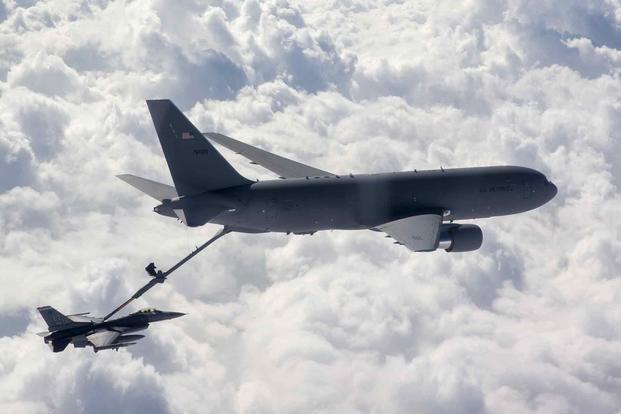Just two and a half years after the Air Force's newest refueling tanker was delivered to the service, officials have begun their search for yet another tanker that would bridge the gap between the KC-46 Pegasus and a future aerial refueling capability.
In a sources-sought notice posted on the government's acquisition and awards website, beta.sam.gov, the Air Force announced plans to buy between 140 to 160 "KC-Y" commercial derivative tankers at a rate of 12 to 15 aircraft per year.
Read Next: Army National Guard to Halt Re-Up Bonuses Amid Sky-High Retention
"The Commercial Derivative Aircraft must be operational by 2029," the notice states, adding that the Air Force is still developing the requirements.
The push toward KC-Y comes as the Pentagon finalizes its business case analysis for an air refueling leasing program due to ongoing issues with the KC-46, chief among them a glitch in its Remote Vision System, or RVS, software.
The first KC-46s were delivered in January 2019 despite the problem with RVS, a critical feature that permits the in-flight operator to view the refueling system below the tanker.
Gen. Stephen R. Lyons, head of U.S. Transportation Command,or TRANSCOM, said last year that private contracted tankers would help relieve some of the stress on the current, overworked KC-135 Stratotanker and KC-10 Extender fleets.
The aging fleets are largely responsible for the U.S. military's global tanker requests since the KC-46 still isn't ready for an overseas deployment to a combat region -- and won't be ready until at least 2023, officials have said. The KC-46 was this year cleared to begin accepting mission tasks from TRANSCOM on a case-by-case basis.
KC-Y and its follow-on, KC-Z, have been long expected, with some officials hinting a future program may take the shape of an upgraded or modified KC-46. Boeing told Defense News that it anticipates offering the KC-46 for the bridge tanker program.
"We've learned a lot and we're going to focus on the Air Force's needs, fulfilling the requirements of the contract, and providing exactly what the Air Force wants; we're ready to compete," Mike Hafer, head of Boeing's KC-46A Business Development team, told the outlet.
But lawmakers may not be too keen to pursue that option given the troubled program thus far.
During a House Armed Services Committee hearing Wednesday, some lawmakers questioned whether the service should recompete its current contract with Boeing Co, the KC-46's manufacturer, or potentially curtail its total procurement because of the company's substandard performance.
Boeing has delivered more than 40 KC-46s to the Air Force. The service plans to buy 179 aircraft.
Rep. Jerry Carl, a Republican from Alabama, mused that the Air Force should consider approaching Airbus for additional capability, since the European-made A330 tanker often refuels its military aircraft. Carl's district includes Airbus Mobile, an assembly site for Airbus's commercial airplanes division.
"Knowing that we've got an aircraft that can be built in America, that could be already delivered because we're up to about three a month coming out of Mobile right now -- not this particular plane, but basically the same scale -- why are we not bringing this back up for a bid?" Carl said.
"I would strongly urge you to look at recompeting," added Rep. Rob Wittman, a Republican from Virginia.
Acting Air Force Secretary John Roth responded that recompeting the contract would likely complicate matters further, with no cost-benefit, while it seeks to buy another aircraft.
"We're concerned that if we try to go into a new contractual vehicle, that would put additional delays into the program that we simply don't think would be efficacious for us," he said.
In 2018, Lockheed Martin and Airbus announced a partnership for a Multi-Role Tanker Transport (MRTT) A330 derivative for the purpose of supplementing the overtasked Air Force fleets.
Rob Fuller, a Lockheed Martin spokesman, told DefenseOne Wednesday the two companies also intend to compete for the KC-Y program.
"We are responding to the U.S. Air Force's Sources Sought Notification for the Bridge Tanker Program, offering a mission-ready solution to meet the Air Force's future tanker requirements," Fuller said.
-- Oriana Pawlyk can be reached at oriana.pawlyk@military.com. Follow her on Twitter at @Oriana0214.
Related: The New Air Force One Plane May Fall a Year Behind Schedule, Air Force Says














